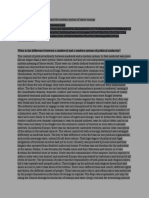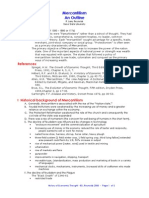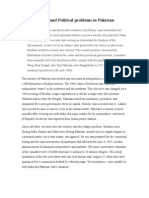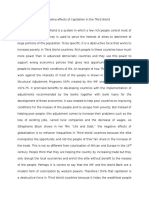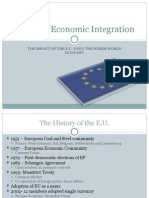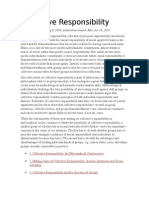Effect of Great Depression in Europe
Effect of Great Depression in Europe
Uploaded by
ScorpioCopyright:
Available Formats
Effect of Great Depression in Europe
Effect of Great Depression in Europe
Uploaded by
ScorpioOriginal Description:
Copyright
Available Formats
Share this document
Did you find this document useful?
Is this content inappropriate?
Copyright:
Available Formats
Effect of Great Depression in Europe
Effect of Great Depression in Europe
Uploaded by
ScorpioCopyright:
Available Formats
EFFECT OF GREAT
DEPRESSION IN EUROPE
INTRODUCTION
The worldwide economic crisis known as the Great Depression
can be traced back to the economic and political problems which
followed World War I. While the Great Depression tended to affect
most countries in a similar way, the factors which caused the
economic slump in each country were slightly different. This
chapter discusses the causes and impact that the Great
Depression had on three prominent European countries: Britain,
Germany and France.
Post-war Europe
Some historians and economists believe that since the crash of
the Wall Street Stock Exchange is considered as the official
beginning of the Great Depression, the crash caused the
Depression. Long before 1929, however, countries in Europe
were struggling with their failing economies and high
unemployment rates.
Unlike the United States, which did not enter World War I until one
year before it ended, the close geographical proximity to the war
front prevented European countries from being anything other
than heavily involved in the war from the beginning. Many
European nations did not escape with the comparatively minor
casualties and financial losses of the United States. These
European countries poured all of their economic resources into
the war effort. Nations such as Britain and France even borrowed
money from the United States to finance the purchase of
weapons. In the years which followed the end of the war, many
European nations found themselves with large war expense
debts.
Britain
After the war ended, Britain found herself in an unfamiliar position
- second to the United States as the most powerful player in the
world economy. The preoccupation of military matters among
European nations enabled the United States (and Japan) to begin
to expand their industrial exports. It was not long before Britain
was edged from her position at the forefront of the world market.
Even after the war was over, industries (including steel and
shipbuilding) which had been the core of British export trade
struggled to survive without the military to create a demand for
goods. Cut-backs in production resulted in mass unemployment.
By 1921, two million workers in Britain's industrial centers were
unemployed. To protect their own industries Britain, along with
other countries, began to raise tariffs on foreign imports. This,
however, only decreased international trade and pushed the
country further into the Depression.
In an attempt to restore the economy, 1925 Britain returned to
the Gold Standard(method fixing the value of currency to an
amount of gold) at the pre-war exchange rate. Inflation during the
war, however, resulted in the Pound Sterling becoming
overvalued currency (currency which is too high in relation to
currencies of other countries). This meant that British exports
were more expensive on world markets, thus discouraging foreign
countries from importing Britain's goods.
Some argue that the Gold Standard contributed to the collapse of
world trade. They believe that once Britain abandoned the Gold
Standard in September 1931 (followed by a number of other
nations) British exports were able to enjoy greater competition on
world markets. There are others, however, who believe the
reverse. It has been suggested that without a fixed and
predictable method to determine how many US dollars, for
example, were equivalent to British pounds, international trade
suffered.
Since Britain was no longer the world's banker, having lost much
of her foreign investment, and was unable to rely on her exports,
restoring the economy was not going to be a simple undertaking.
To worsen the situation, Britain and a number of other Allied
nations were dependent upon reparations (compensation for war
damages) from Germany to cover their debt repayments to the
United States. Germany, however, could not afford to pay these
reparations, which often resulted in default (failure to make
payments).
Eventually, the grip of the Depression began to loosen on Britain.
It was upon the outbreak of World War II in 1939, however, that
Britain was able to fully free herself. Unemployment dropped as
workers were organized into preparing the country for war.
Germany
In accordance with the peace treaties which were secured at the
1919 Paris Peace Conference, Germany and her former allies
were required to pay reparations to the Allied nations. Aside from
having incurred massive costs during the war, Germany had
territory (containing natural resources which had previously
served as a significant source of income) seized from her under
the same peace treaties. Germany could not afford to pay the
expected sum of 6.6 billion. After paying her first instalment of 2
billion, Germany defaulted on the second payment the following
year. In 1923, refusing to accept that Germany could not meet her
financial obligations, the French invaded the Ruhr Valley
(Germany's richest industrial area).
In an attempt to alleviate the pressure on the German economy,
more money was printed. Inflation (rising prices) quickly
escalated to epic proportions, resulting in people's money
becoming worthless. During this time, Germans even used paper
money to light the fire in their stoves. Between 1918 and
November 1923, a loaf of bread which had previously cost two
thirds of a mark (German currency) had risen to cost 201 billion
marks. (Refer to Topic 6: Germany, Chapter 2: Hyperinflation and
Stresemann).
For these reasons, in addition to the United States withdrawing
her loans to Germany following the 1929 crash on Wall Street,
Germany was the first country to sink under the weight of the
Great Depression. As factories and businesses closed, by 1931
over 5 million Germans were unemployed. Despite being one of
the countries hardest hit by the Depression, Germany was also
the first nation to escape the worst of the Depression. It was,
however, a by-product. Adolf Hitler's actions were primarily
intended to serve a military purpose, rather than an economic
one. By 1936 Hitler had almost eliminated unemployment by
increasing government spending, particularly through the
manufacture of machinery and armaments in preparation for war.
This increase in spending was the complete opposite to the
prevailing strategies of the time.
France
Despite France suffering severe destruction during World War I,
she made considerable attempts to restore her pre-war economy.
Since it was not a country as heavily dependent on trade, France
was not immediately affected by the Depression like many other
European nations.
It was not until around 1932-1933 that France was crushed by the
Depression. The severity of the Depression, however, was no less
than in other countries. For much of the 1930s France was faced
with an overvalued currency and political unrest, which was
indicated by the 6 February 1934 riots in Paris.
You might also like
- When Did Independent States and The Modern System of States EmergeDocument7 pagesWhen Did Independent States and The Modern System of States EmergefrustratedlawstudentNo ratings yet
- An Analysis of The Structural Adjustment Program in Colombia and VenuezlaDocument4 pagesAn Analysis of The Structural Adjustment Program in Colombia and VenuezlaRen Ren HewittNo ratings yet
- Application Under Section 476Document2 pagesApplication Under Section 476Asad Saeed100% (5)
- Causes and Consequences of The Great Depression in AmericaDocument5 pagesCauses and Consequences of The Great Depression in AmericaCheapestPapers100% (2)
- The Chinese Economic Miracle - AbridgedDocument36 pagesThe Chinese Economic Miracle - AbridgedJonathan ClyneNo ratings yet
- The Great Depression 1930Document2 pagesThe Great Depression 1930FaHaD HaSSaN NooRNo ratings yet
- Great Depression Causes!!!Document10 pagesGreat Depression Causes!!!api-278664767No ratings yet
- Chile Anatomy of An Economic Miracle, 1970-1986Document3 pagesChile Anatomy of An Economic Miracle, 1970-1986alexandrosminNo ratings yet
- De Cachet, and Then Went To Prison Without A TrialDocument4 pagesDe Cachet, and Then Went To Prison Without A TrialdanielqoeyNo ratings yet
- Rise of Fascism in ItalyDocument2 pagesRise of Fascism in ItalySophie Cor - Pé67% (3)
- Physiocracy & MercantilismDocument8 pagesPhysiocracy & MercantilismNobin ChowdhuryNo ratings yet
- Hernando de Soto - The Other PathDocument11 pagesHernando de Soto - The Other PathJehan SiregarNo ratings yet
- Russian Revolution NotesDocument18 pagesRussian Revolution NotesChan KimNo ratings yet
- The Great DepressionDocument11 pagesThe Great DepressionSamiyaIllias100% (2)
- Ramirez PSC31 ASEAN China Trade Relations The Impact of China's Zero COVID Policy On The Economic Performance of ASEAN Member StatesDocument10 pagesRamirez PSC31 ASEAN China Trade Relations The Impact of China's Zero COVID Policy On The Economic Performance of ASEAN Member StatesJoshua RamirezNo ratings yet
- Economic Crisis: World Food System - The Battle against Poverty, Pollution and CorruptionFrom EverandEconomic Crisis: World Food System - The Battle against Poverty, Pollution and CorruptionNo ratings yet
- The Theory of Hegemonic Stability - Central IdeaDocument2 pagesThe Theory of Hegemonic Stability - Central IdeaShabnamNo ratings yet
- FATA and PakistanDocument11 pagesFATA and PakistanAsif MirzaNo ratings yet
- Evolution of Money and BankingDocument17 pagesEvolution of Money and BankingUmar HayatNo ratings yet
- MERCANTILISTDocument5 pagesMERCANTILISTChioma UzodinmaNo ratings yet
- The Impact of Globalisation On Poverty and Inequality in The Global SouthDocument4 pagesThe Impact of Globalisation On Poverty and Inequality in The Global SouthKassyap VempalliNo ratings yet
- Review - The Economic History of India, 1857 To 1947Document7 pagesReview - The Economic History of India, 1857 To 1947Vinicius Kauê FerreiraNo ratings yet
- Devlopment and DependencyDocument7 pagesDevlopment and Dependencygangadhar119No ratings yet
- Difference Between Scientific and UtopiaDocument8 pagesDifference Between Scientific and UtopiaSacha RudyNo ratings yet
- Causes of The Great DepressionDocument11 pagesCauses of The Great DepressionRanjani RamanujamNo ratings yet
- The Transition DebateDocument9 pagesThe Transition DebateGideon Mathson100% (1)
- Constitutional and Political Problems in PakistanDocument8 pagesConstitutional and Political Problems in Pakistanhayyabukhari33% (3)
- Assignment: Political ScienceDocument9 pagesAssignment: Political Sciencezohaib hassan ShahNo ratings yet
- Merchantilism. (Adam Smith) International EconomyDocument6 pagesMerchantilism. (Adam Smith) International EconomyMavlonbek SolievNo ratings yet
- Snyder From Voting To ViolenceDocument49 pagesSnyder From Voting To ViolenceMaggie PeltierNo ratings yet
- Business Cycles in Romania PAperDocument10 pagesBusiness Cycles in Romania PAperElena PotoroacăNo ratings yet
- The Negative Effects of Capitalism in The Third WorldDocument4 pagesThe Negative Effects of Capitalism in The Third WorldPaul Michael Hizon100% (2)
- The Great DepressionDocument2 pagesThe Great DepressionRohan Srivastava0% (1)
- The Great DepressionDocument4 pagesThe Great Depressionapi-283823164No ratings yet
- CapitalismDocument35 pagesCapitalismJanu - Lee Tarnate80% (10)
- Vincent Ferraro - Dependency TheoryDocument8 pagesVincent Ferraro - Dependency TheoryTolessaNo ratings yet
- Topic-1: Otto Von Bismarck's Foreign Policy: Assignment HSB-675: MODERN WORLD (1871-1992)Document7 pagesTopic-1: Otto Von Bismarck's Foreign Policy: Assignment HSB-675: MODERN WORLD (1871-1992)MOHAMAMD ZIYA ANSARINo ratings yet
- Poland Case StudyDocument3 pagesPoland Case StudyFastdog9128No ratings yet
- German ReunificationDocument26 pagesGerman ReunificationXAVIERNo ratings yet
- Be Project - Us China Trade WarDocument26 pagesBe Project - Us China Trade WarRishab VermaNo ratings yet
- Causes of Rise of Fascism in ItalyDocument10 pagesCauses of Rise of Fascism in ItalyTaimur KhanNo ratings yet
- Project Work On CommunalismDocument13 pagesProject Work On CommunalismNikhil KumarNo ratings yet
- Women Empowerment: DEVTA" How Much The Situations Have Changed That There Was A Time When We Used To BelieveDocument2 pagesWomen Empowerment: DEVTA" How Much The Situations Have Changed That There Was A Time When We Used To BelieveSHIVANI PANDEYNo ratings yet
- The Origins of Egyptian Working Class - Joel BeininDocument12 pagesThe Origins of Egyptian Working Class - Joel BeininCeci RodríguezNo ratings yet
- Lichbach - Kurs Z Comparative PoliticsDocument59 pagesLichbach - Kurs Z Comparative PoliticsRobert SkylineNo ratings yet
- Susan Strange - States, Firms and DiplomacyDocument16 pagesSusan Strange - States, Firms and Diplomacyunevola100% (2)
- The Rise and Fall of Money Manager CapitalismDocument38 pagesThe Rise and Fall of Money Manager CapitalismtymoigneeNo ratings yet
- Disadvantages of Eu EnlargementDocument12 pagesDisadvantages of Eu Enlargementapi-7859327No ratings yet
- Financialsation & CrisisDocument20 pagesFinancialsation & CrisissushilkhannaNo ratings yet
- Stalin NotesDocument6 pagesStalin NotesJames PhamNo ratings yet
- Questions and Answers On Stalin RussiaDocument52 pagesQuestions and Answers On Stalin RussiaHaddonesKimberlyNo ratings yet
- Congress of Vienna WorksheetDocument5 pagesCongress of Vienna WorksheetDiego A. RamírezNo ratings yet
- 7.soviet Union DisintegrationDocument5 pages7.soviet Union DisintegrationUsamahNo ratings yet
- Capitalism Vs Socialism'Document7 pagesCapitalism Vs Socialism'ejaz_balti_1No ratings yet
- Great DepressionDocument34 pagesGreat DepressionUyen NgoNo ratings yet
- The Nature of Fascism RevisitedDocument26 pagesThe Nature of Fascism RevisitedFrancisco Cobo RomeroNo ratings yet
- Globalisation Final NotesDocument47 pagesGlobalisation Final NotesMuse SamNo ratings yet
- Albert HirschmanDocument34 pagesAlbert HirschmanLuisa Fernanda QNo ratings yet
- On Globalisation and Its DiscontentsDocument40 pagesOn Globalisation and Its DiscontentsShachetan Shukla67% (6)
- A Third Concept of Liberty: Judgment and Freedom in Kant and Adam SmithFrom EverandA Third Concept of Liberty: Judgment and Freedom in Kant and Adam SmithRating: 3 out of 5 stars3/5 (1)
- IB CAS Proposal FormDocument4 pagesIB CAS Proposal FormMahuta MahaNo ratings yet
- C Tech Copper 4.0 One PagerDocument2 pagesC Tech Copper 4.0 One PagerSAMNo ratings yet
- Quareia-The Adept: Module X-The True Adept Lesson 3: Sed IDocument20 pagesQuareia-The Adept: Module X-The True Adept Lesson 3: Sed IRick SanchezNo ratings yet
- Aldwin Jann Louis Y. AlmazanDocument3 pagesAldwin Jann Louis Y. AlmazanSalman DelfinNo ratings yet
- (TRICK) How To Stop Google Play Store Self Update - Easy!: Login RegisterDocument10 pages(TRICK) How To Stop Google Play Store Self Update - Easy!: Login RegistersimonchikNo ratings yet
- Foc MidDocument16 pagesFoc Midaishwarya rekhaNo ratings yet
- Mrinmaydeycommunication Ce (Oe) 601a 10601321042Document6 pagesMrinmaydeycommunication Ce (Oe) 601a 10601321042mchayan489No ratings yet
- English 4 Q2 M5 Week5 MELC05 Simple Present Tense of Verbs - MaElainePre - FINALDocument11 pagesEnglish 4 Q2 M5 Week5 MELC05 Simple Present Tense of Verbs - MaElainePre - FINALLaine RepNo ratings yet
- Cagayan State UniversityDocument18 pagesCagayan State UniversitySheryl NatinoNo ratings yet
- Sausage 3Document4 pagesSausage 3npxuanmai221No ratings yet
- DETAILED LESSON PLAN ENGLISH 6 Week 6Document12 pagesDETAILED LESSON PLAN ENGLISH 6 Week 6Mark Prian Iposada100% (1)
- M.Tech EEE POWER SYSTEM CONTROL AND AUTOMATION 1Document57 pagesM.Tech EEE POWER SYSTEM CONTROL AND AUTOMATION 1RvdNo ratings yet
- Collective ResponsibilityDocument34 pagesCollective ResponsibilityalbertolecarosNo ratings yet
- Time-Delay Systems An Overview of Some Recent Advances and Open ProblemsDocument28 pagesTime-Delay Systems An Overview of Some Recent Advances and Open Problemsmaniahmad100% (1)
- Class-4-NSO-5-years-(Instant-Download-eBook)---Level-2Document59 pagesClass-4-NSO-5-years-(Instant-Download-eBook)---Level-2ayaanshsharma213No ratings yet
- Inside The Perimeter: Six Steps To Improve Your Security MonitoringDocument43 pagesInside The Perimeter: Six Steps To Improve Your Security MonitoringjeffgrantinctNo ratings yet
- Packet Tracer - Verify Ipv4 and Ipv6 AddressingDocument3 pagesPacket Tracer - Verify Ipv4 and Ipv6 AddressingL HammeRNo ratings yet
- Power 1 Chapter-6 PDFDocument29 pagesPower 1 Chapter-6 PDFEnyew100% (1)
- Vengeance Is Self-FocusedDocument18 pagesVengeance Is Self-FocusedCarolina LenisNo ratings yet
- List of Dharmaraja College AlumniDocument8 pagesList of Dharmaraja College AlumniLahiru RajakarunaNo ratings yet
- The Victorian AgeDocument14 pagesThe Victorian AgeDesireeNo ratings yet
- The Hyborian Age BRPDocument9 pagesThe Hyborian Age BRPWes100% (1)
- Radiator - MountingDocument3 pagesRadiator - MountingJESUSNo ratings yet
- G.R. No. 176020 Heirs of Julao v. de JesusDocument8 pagesG.R. No. 176020 Heirs of Julao v. de JesusVernis VentilacionNo ratings yet
- Samsung UN55D7000LF ManualDocument325 pagesSamsung UN55D7000LF ManualLarry KimNo ratings yet
- Essential Interviewing Skills For The Helping Professions: A Social Justice and Self-Care Approach Nicole NicoteraDocument57 pagesEssential Interviewing Skills For The Helping Professions: A Social Justice and Self-Care Approach Nicole Nicoterasaszarigos100% (1)
- Football Refers To A Number of Sports That Involve, To Varying Degrees, Kicking A Ball With The Foot ToDocument2 pagesFootball Refers To A Number of Sports That Involve, To Varying Degrees, Kicking A Ball With The Foot Toyenen12345No ratings yet
- BOOK David Miller - Measurement by The Physical Educator - Why and How (2010, McGraw-Hill Education) - Libgen - lc-111-117Document7 pagesBOOK David Miller - Measurement by The Physical Educator - Why and How (2010, McGraw-Hill Education) - Libgen - lc-111-117R DarmawanNo ratings yet
- Progress Report: Design Considerations of Go KartDocument6 pagesProgress Report: Design Considerations of Go KartINNOVIZ 19No ratings yet
